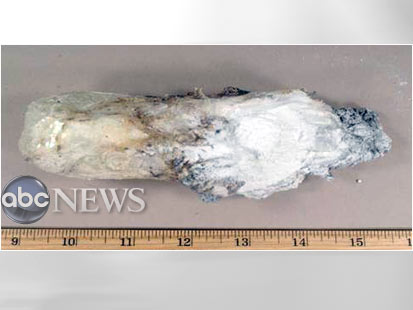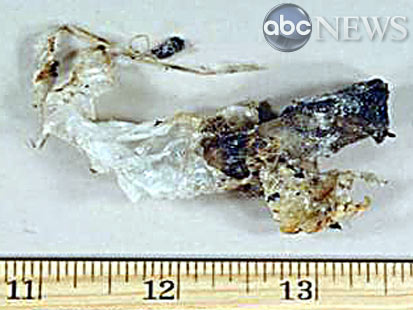EXCLUSIVE: Photos of the Northwest Airlines Flight 253 Bomb
Accused bomber Abdulmutallab's underwear, explosive packet and detonator.
Dec. 28, 2009 — -- A singed pair of underwear with a packet of powder sewn into the crotch, seen in government photos obtained exclusively by ABC News, is all that remains of al Qaeda's attempt to down an American passenger plane over Detroit.
As seen in these photos, the alleged bomb consisted of a packet of powder sewn into the briefs of Umar Farouk Abdulmutallab, a 23-year-old Nigerian. Al Qaeda took credit Monday for the attempted bombing, boasted of its ability to overcome U.S. intelligence and airport security, and promised new attacks.
The first photo, to the left, shows the slightly charred underpants with the bomb packet still in place. All photos include a ruler to provide scale.
The bomb packet is a six-inch long container of the high-explosive chemical PETN, less than a half cup in volume, weighing about 80 grams.
In the second photo (right), the packet of explosive powder has been removed from the underpants and displayed separately.
A government test with 50 grams of PETN blew a hole in the side of an airliner. That was the amount in the bomb carried by the so-called shoe bomber Richard Reid over Christmas 2001.
The underpants bomb would have been one and a half times as powerful.
Acid in Syringe Was Detonator
The packet of PETN explosive powder is shown separately here.
Tragedy was averted only because the detonator, acid in a syringe, did not work.
"It's very clear it came very, very close," said Rep. Pete Hoekstra, R.-Mich., ranking minority member of the House Intelligence Committee. "The explosive device went off, but it became an incendiary device instead of an explosive device, which is probably what saved that airplane."
The acid in the melted plastic syringe, pictured below, caused a fire but did not make proper contact with the PETN.
Abdulmutallab told FBI agents he received the bomb from and was trained by al Qaeda in Yemen over the last few months.
In a web posting today, the al Qaeda group displayed a picture of Abdulmutallab, calling him a hero who "overcame legendary American intelligence which showed its fragility, putting its nose in the ground, using all of what they spent in new security techniques against them."
The al Qaeda group in Yemen has been calling for attacks against the U.S. for months.
Two of its four top leaders were U.S. prisoners at Guantanamo until November, 2007 when they were turned over to Saudi Arabia and then set free after supposedly being rehabilitated.
Now U.S. officials say these men have shown they pose a much greater operational threat than al Qaeda in Pakistan or Afghanistan.
Richard Clarke: Yemen is the new Afghanistan. It is the new sanctuary, the new al Qaeda base where people from around the world, who want to be trained are sent. No longer to Afghanistan, but to Yemen.a
In its statement today, the al Qaeda group said the attempt to bring down the jet was retaliation for U.S. air strikes in Yemen.
But those air strikes took place on December 17, and Abdulmutallab's mission was already underway then as he bought his ticket to Detroit on Dec. 16.
Click Here for the Blotter Homepage.
The packet of PETN explosive powder is shown separately here.
Tragedy was averted only because the detonator, acid in a syringe, did not work.
"It's very clear it came very, very close," said Rep. Pete Hoekstra, R.-Mich., ranking minority member of the House Intelligence Committee. "The explosive device went off, but it became an incendiary device instead of an explosive device, which is probably what saved that airplane."
The acid in the melted plastic syringe, pictured below, caused a fire but did not make proper contact with the PETN.
Abdulmutallab told FBI agents he received the bomb from and was trained by al Qaeda in Yemen over the last few months.
In a web posting today, the al Qaeda group displayed a picture of Abdulmutallab, calling him a hero who "overcame legendary American intelligence which showed its fragility, putting its nose in the ground, using all of what they spent in new security techniques against them."
The al Qaeda group in Yemen has been calling for attacks against the U.S. for months.
Two of its four top leaders were U.S. prisoners at Guantanamo until November, 2007 when they were turned over to Saudi Arabia and then set free after supposedly being rehabilitated.
Now U.S. officials say these men have shown they pose a much greater operational threat than al Qaeda in Pakistan or Afghanistan.
Richard Clarke: Yemen is the new Afghanistan. It is the new sanctuary, the new al Qaeda base where people from around the world, who want to be trained are sent. No longer to Afghanistan, but to Yemen.a
In its statement today, the al Qaeda group said the attempt to bring down the jet was retaliation for U.S. air strikes in Yemen.
But those air strikes took place on December 17, and Abdulmutallab's mission was already underway then as he bought his ticket to Detroit on Dec. 16.
Click Here for the Blotter Homepage.
In its statement today, the al Qaeda group said the attempt to bring down the jet was retaliation for U.S. air strikes in Yemen.
But those air strikes took place on December 17, and Abdulmutallab's mission was already underway then as he bought his ticket to Detroit on Dec. 16.

